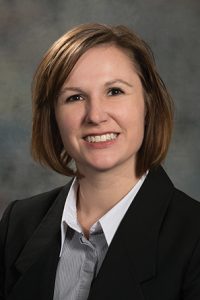Medicaid oversight committee proposed
A bill that would establish legislative oversight of the state’s new Medicaid integrated managed care system was considered Feb. 1 by the Executive Board.

LB442, introduced by Lincoln Sen. Kate Bolz, would create the Medical Managed Care Organization Oversight Committee within the Legislature.
Bolz said managed care in Nebraska — which currently encompasses physical, behavioral and pharmacy services — will cost approximately $1.2 billion annually to provide services to more than 200,000 Nebraskans.
“Such a significant portion of the state’s budget deserves our scrutiny,” she said, adding that an oversight committee would provide Legislative engagement in the process to ensure that the Heritage Health system is providing appropriate, quality services in a cost-effective manner.
Annette Dubas, executive director of the Nebraska Association of Behavioral Health Organizations, testified in support of the bill. The development and implementation of the Heritage Health managed care system is a sizeable change from how services have been provided in the past, she said.
The state Department of Health and Human Services (DHHS) has been transparent and communicated openly during the process, she said, but more oversight would be welcome.
“Any change of this magnitude will encounter bumps along the way,” Dubas said, adding that providers will be dealing with new credentialing requirements, claim processing and other administrative procedures.
Molly McCleery of Nebraska Appleseed also testified in support. She said stakeholders need to be sure that the new integrated managed care system will save money and provide better access and care. A Legislative oversight committee would enhance the work that DHHS already is undertaking, McCleery said.
“A new attention on some of the details and the pieces of this bill that require data gathering is important,” she said. “In order for managed care systems to be effective you need transparency, accountability and efficiency.”
Calder Lynch, director of the DHHS Division of Medicaid and Long-term Care, testified in opposition to the bill. The department does not object to transparency and oversight, he said, but the program already is excelling in those areas.
Lynch said thousands of Nebraska stakeholders participated in town hall meetings during the development of Heritage Health and the rollout of the system has been smooth overall. For example, he said, 100 percent of claims have been processed within contractual time limits since the system’s implementation on Jan. 1.
“LB442 would duplicate existing oversight of the Medicaid program, growing government unnecessarily,” Lynch said, adding that the Legislature’s standing Health and Human Services Committee and federal oversight are more than sufficient.
Under the bill, the oversight committee would include the chairperson and vice chairperson — or their designees — of the Appropriations and Health and Human Services committees, as well as three senators appointed by the Executive Board.
The committee would study the delivery of services under Medicaid and the Children’s Health Insurance Program and provide a report to a joint meeting of the Appropriations and Health and Human Services committees annually. The study would include information regarding:
• community outreach efforts;
• a comparison of caseload information;
• actual as compared to projected costs;
• integration and coordination of health care procedures;
• quality of care and health outcomes for individuals receiving services under the managed care system; and
• the availability of information to the public regarding services, including accessibility, expenditures and consumer satisfaction.
The committee would terminate on Dec. 31, 2020, unless reauthorized by the Legislature.
The Executive Board took no immediate action on the bill.

